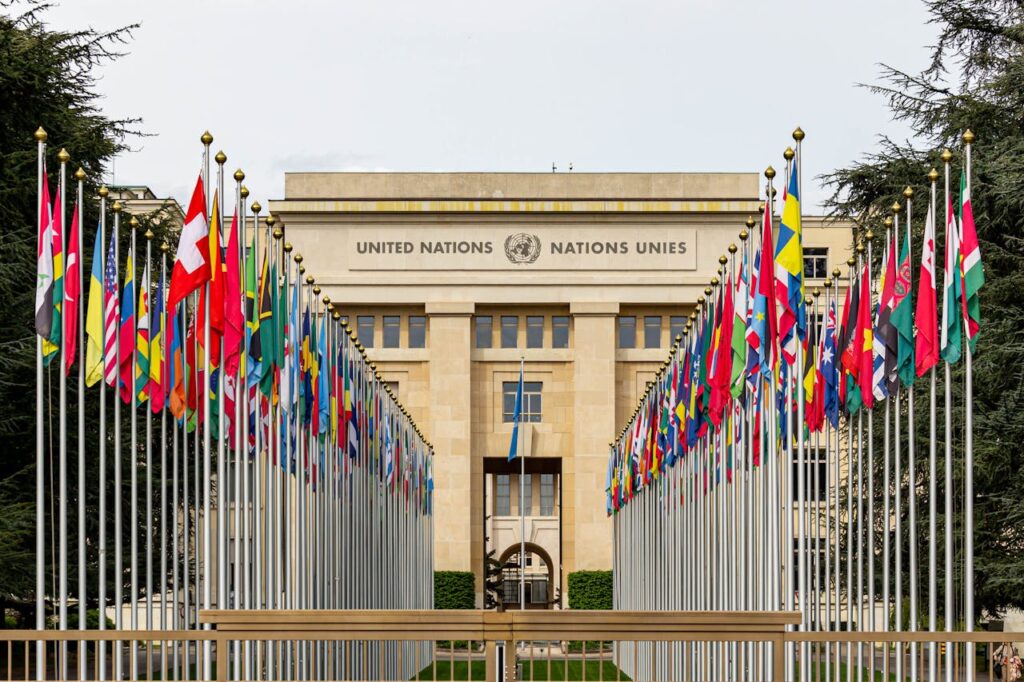
Explore & Play
Discover interesting topics and solve the accompanying crossword puzzle.
Organization Crossword | Role of Global Organizations and Their Influence
Table of Contents
You can start by testing your knowledge with the organization crossword, or if you’re not yet familiar with the topic, feel free to read through the article first to gain more insight. Afterward, return to the crossword and challenge yourself with what you’ve learned!
Organization Crossword
You can either fill in the crossword puzzle directly on this page or click the button in the bottom right corner to print it for free.

The Role of Global Organizations in Addressing the World's Most Pressing Issues
Introduction: The Power of Global Organizations in a Complex World
In an increasingly interconnected world, global organizations play a pivotal role in tackling the world’s most pressing challenges, from climate change to health crises, economic inequality to human rights. These organizations bring together resources, expertise, and diverse stakeholders to create meaningful solutions. Whether it’s alleviating poverty, addressing global health issues, or preserving the environment, the efforts of these organizations shape the trajectory of global development.
As we delve into their contributions, we will explore how international bodies have influenced global policies and decisions, providing a critical understanding of the complexities they address. Moreover, we’ll examine the key organizations making these strides and how they are reshaping the world.
Overview of Global Organizations
What Are Global Organizations?
Global organizations refer to institutions or bodies that work across national boundaries to address various global issues. These entities typically focus on areas such as peacekeeping, economic development, health, environmental sustainability, and human rights. They unite governments, NGOs, the private sector, and even individuals to develop solutions that affect the global community.
The Importance of Global Collaboration
The importance of collaboration in today’s world cannot be overstated. With the advent of globalization, many challenges no longer exist within isolated borders. Whether it’s a pandemic, climate change, or terrorism, these issues require international cooperation. Organizations like the United Nations (UN), the World Health Organization (WHO), and the International Monetary Fund (IMF) are the anchors of global cooperation. Their collective work helps bridge the gaps between countries and regions, creating a unified approach to problem-solving.
Global Governance: The Role of International Bodies
Shaping Global Policies and Security
One of the most prominent forms of global cooperation is seen through international bodies like the United Nations and the European Union, which shape policies and provide leadership in diplomacy, peace, and security. The United Nations (UN), for instance, coordinates international efforts to prevent conflicts, maintain peace, and promote human rights. Through peacekeeping missions, negotiations, and multilateral action, it has been a cornerstone of diplomacy for over seven decades.
Strengthening Security and Diplomacy
Alongside the UN, NATO (North Atlantic Treaty Organization) plays a key role in providing security across Europe and North America. By fostering military cooperation among its member states, NATO ensures collective defense against external threats, serving as a strong deterrent to aggression. The European Union (EU), while primarily a political and economic union, also contributes significantly to global governance by promoting stability, cooperation, and integration within Europe and globally.
Upholding Justice Through International Law
The International Criminal Court (ICC) is another key actor, established to prosecute individuals for serious crimes such as genocide and war crimes. This international court has helped to shape the global approach to justice by ensuring accountability and promoting the rule of law. The International Atomic Energy Agency (IAEA) works to prevent the spread of nuclear weapons, focusing on ensuring the peaceful use of nuclear energy and promoting global security.
Economic Stability: How Financial Organizations Shape the Global Economy
Promoting Global Economic Growth
Economic stability and development are central to addressing global inequality, and organizations like the World Bank and the IMF help ensure that global economies can function smoothly. The World Bank provides financial and technical assistance to developing countries, helping them build infrastructure, improve education systems, and reduce poverty. By offering low-interest loans and grants, it plays a crucial role in fostering long-term economic development across the world.
Facilitating International Trade
Similarly, the International Monetary Fund (IMF) supports global economic stability by promoting international monetary cooperation, offering policy advice, and providing financial assistance to countries facing economic crises. The World Trade Organization (WTO) is another key organization, overseeing international trade rules and facilitating trade negotiations. By ensuring that global trade flows smoothly, the WTO helps countries expand their markets and promotes economic integration.
Supporting Sustainable Development
The Organization for Economic Cooperation and Development (OECD) works to promote policies that improve the economic and social well-being of people worldwide. The OECD focuses on promoting sustainable growth by supporting education, innovation, and responsible environmental practices. Similarly, the Organization of Petroleum Exporting Countries (OPEC) is responsible for coordinating and unifying petroleum policies among its member states, ensuring that global oil markets remain stable.
Health and Humanitarian Aid: Organizations Saving Lives
Responding to Health Crises
From responding to natural disasters to fighting pandemics, humanitarian organizations such as the World Health Organization and Doctors Without Borders are on the front lines, making a profound impact on global health. The World Health Organization (WHO) plays a leading role in coordinating global health responses, addressing health inequalities, and providing technical support to countries facing epidemics.
Providing Emergency Relief
Humanitarian aid organizations, like Doctors Without Borders (Médecins Sans Frontières), provide medical care to people in crisis areas. Whether it’s in the aftermath of natural disasters or conflict zones, their teams provide life-saving treatments, vaccines, and medical expertise. The Red Cross and the Salvation Army also play critical roles in disaster relief, offering food, shelter, and support to those affected by emergencies worldwide.
Fighting Hunger and Poverty
The World Food Programme (WFP), the food assistance arm of the United Nations, is at the forefront of the global fight against hunger. It delivers food to communities in crisis and works with governments to combat hunger, malnutrition, and food insecurity. The Bill & Melinda Gates Foundation also plays a pivotal role in global health, funding initiatives to fight diseases like malaria, polio, and HIV/AIDS while promoting access to healthcare and education.
Environmental Protection: Fighting Climate Change and Protecting the Planet
Tackling Environmental Issues
The fight against climate change and environmental degradation is being led by organizations like Greenpeace and the World Wildlife Fund, which work tirelessly to promote sustainable practices across the globe. Greenpeace advocates for environmental protection through direct action campaigns, while the World Wildlife Fund (WWF) works to conserve the world’s most vulnerable species and ecosystems. These organizations are instrumental in driving global awareness about environmental issues.
Promoting Sustainable Development
The UN Environment Programme (UNEP) is also a key organization focused on promoting sustainability through its environmental policies. It works globally to ensure the planet’s ecosystems are preserved for future generations. Similarly, the International Union for Conservation of Nature (IUCN) plays a significant role in setting environmental standards and promoting sustainable development practices.
Human Rights and Social Justice: Advocating for the Underserved
Protecting Human Rights
Many global organizations are dedicated to promoting human rights and social justice, ensuring that the voices of the marginalized are heard on the international stage. Amnesty International has long advocated for the rights of prisoners of conscience, while Human Rights Watch has provided critical documentation and support for victims of human rights abuses across the globe.
Ensuring Equality and Justice
The Carter Center works to improve human rights and alleviate suffering by engaging in conflict resolution, democracy-building, and the prevention of diseases. Similarly, the International Labour Organization (ILO) focuses on ensuring that workers around the world have fair wages, decent working conditions, and protection from exploitation.
Technology and Innovation: Bridging Gaps with Global Collaboration
Advancing Global Technology
Technology and innovation are essential to modern solutions for global problems, and organizations such as the International Telecommunications Union and NASA are leading efforts to harness technology for global benefit. The International Telecommunications Union (ITU) facilitates global communication and ensures that technology infrastructure meets the needs of all nations.
Space Exploration and Scientific Collaboration
NASA is also at the forefront of technological and scientific innovation, contributing to space exploration, climate research, and the development of new technologies that have the potential to transform life on Earth. As an organization, NASA’s work goes beyond space exploration, impacting fields such as education, environmental monitoring, and technology development.
Cultural and Educational Advancements: Enriching Societies Globally
Promoting Education and Cultural Exchange
Promoting education, culture, and social development is central to creating a more equitable world, and UNESCO plays a key role in advancing these goals worldwide. Through its education programs, UNESCO strives to ensure that all people, regardless of background or location, have access to quality education. The International Labour Organization (ILO) also contributes to the global workforce’s development by promoting job training and fostering economic opportunities for all.
The Future of Global Organizations: Challenges and Opportunities
Evolving Challenges and the Path Forward
As the world faces new challenges, such as pandemics, climate change, and emerging technologies, global organizations must adapt and innovate to remain relevant and effective. The COVID-19 pandemic, for example, tested the ability of global health organizations like the WHO to respond rapidly to a crisis. Similarly, environmental organizations face increasing challenges as climate change accelerates and the planet’s resources continue to deplete.
The Need for Reform
To remain effective, many organizations will need to reform. They must be agile enough to address emerging threats while still honoring their core missions. This will involve adopting new technologies, fostering greater collaboration, and ensuring that their efforts are aligned with the needs of a changing world.
Global Organizations: Shaping Our Collective Future
In conclusion, global organizations are indispensable in shaping the future, offering solutions to problems that transcend borders, and ensuring cooperation on issues that affect everyone on the planet. Their continued efforts in peacekeeping, health, economic development, and environmental protection are crucial in navigating the complexities of the modern world. As we look to the future, their ability to adapt and innovate will determine how well we can tackle the challenges that lie ahead.
Test Your Knowledge: Play the Crossword!
To dive deeper into the world of global organizations, why not challenge yourself with our crossword puzzle? It features many of the organizations we’ve discussed, and it’s a fun way to test your understanding! Play now and learn more!
Share to...
I hope you enjoy the content.
Want to receive our daily crossword puzzle or article? Subscribe!
You may also be interested in
Share to…
Want to receive our daily crossword puzzle?
-
Jigsaw Puzzles
Art Nouveau Jigsaw Puzzle with Betta Fish in Lush Garden Scene 250 | 300 | 500 Pieces
kr 348,00 – kr 439,00Price range: kr 348,00 through kr 439,00 Select options This product has multiple variants. The options may be chosen on the product page -
Jigsaw Puzzles
Twelve Zodiac Cow Ink Wash Jigsaw Puzzle 250 | 300 | 500 Pieces
kr 348,00 – kr 439,00Price range: kr 348,00 through kr 439,00 Select options This product has multiple variants. The options may be chosen on the product page -
Jigsaw Puzzles
Lofoten Serenity: Abstract Puzzle 250 | 300 | 500 Pieces
kr 348,00 – kr 439,00Price range: kr 348,00 through kr 439,00 Select options This product has multiple variants. The options may be chosen on the product page

















